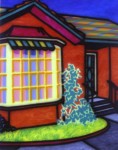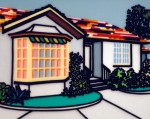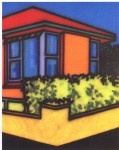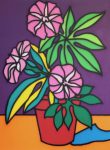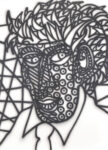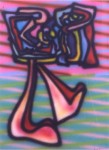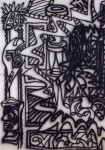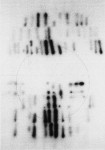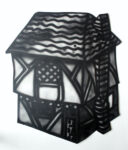1988
1988 Works
Paintings

This work features a contemporary 'spec building', by contrast with the traditional houses depicted in most of the other paintings in Arkley's 1988 Tolarno exhibition.
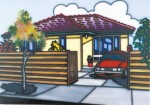
Widely-reproduced work shown in Arkley’s 1988 Tolarno exhibition, exemplifying his developing suburban style.
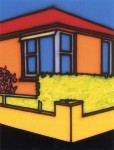
Sold at Arkley’s ‘Houses and Homes’ exhibition at Tolarno in 1988, and subsequently purchased for the BP Collection.

A grand summation of Arkley’s developing suburban theme, this diptych was produced after his 1988 Tolarno show, and subsequently acquired for the national collection.
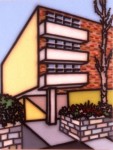
A list of sales in Arkley’s archive records this as the only work from his 1988 Tolarno show to have remained unsold at the time.
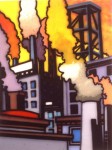
In their reviews of the 1988 Tolarno show, both Juliana Engberg and Robert Rooney singled out this work – the earliest of Arkley’s factory canvases – for particular praise.
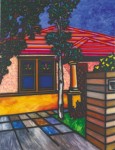
This exemplary suburban image from the 1988 Tolarno show contains extensive passages of ‘painterly’ brush-work alluding to grass, stucco and other textures.
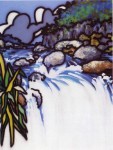
An unusual example of an Arkley landscape, this canvas previously formed part of the National Australia Bank collection.
Works on Paper
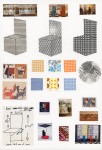
First shown in Arkley’s 1988 ‘Casual Works’ exhibition, and subsequently acquired for the NGV (both components). The main work on paper references Muzak Mural: Chair Tableau (1980-81) [3/M], also in the NGV's collection.
Unidentified. In correspondence in 2008, Hamilton Gallery director Daniel McOwan confirmed that this work was shown there in Nov.1988.
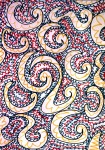
The title ‘Paisley’ is indicated in Richard Brown’s ‘Casual Works’ catalogue essay (1988), and the exhibition review by Juliana Engberg.

The photos taken at the Brisbane showing of Arkley’s 1988 ‘Casual Works’ (detail reproduced here) appear to be the only record of the entire installation.
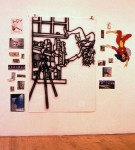
An installation slide in Arkley’s files shows the original ensemble as exhibited in Arkley’s ‘Casual Works’ show at 200 Gertrude Street, May 1988.
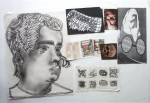
A monochrome version of Tattooed Head (1983) was shown with various photos and sketches of heads and faces. Arkley’s files contain slides of the ensemble as exhibited at 200 Gertrude Street in May 1988.

The overall 1988 installation is only indistinctly visible in the Brisbane shots by Richard Stringer; the ensemble was apparently disassembled after the 1988 exhibitions.

Installation photos taken at the Brisbane installation of Arkley’s ‘Casual Works’ exhibition (1988) document the original arrangement of this material.
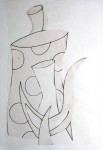
The Brisbane exhibition shots appear to be the only extant documentation of the 1988 installations, whose original title is uncertain.
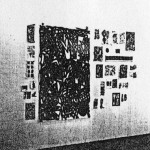
The sole photographic source for the 1988 installation/s is the indistinct IMA exhibition photo reproduced here.
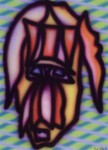
This work was first shown in 1988 in an exhibition of works by ‘Artists Against Animal Experimentation’, where its mutant features probably struck a particular chord.
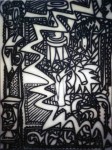
This particular work is documented by an undated Polaroid photo in Arkley’s files – the sole source.
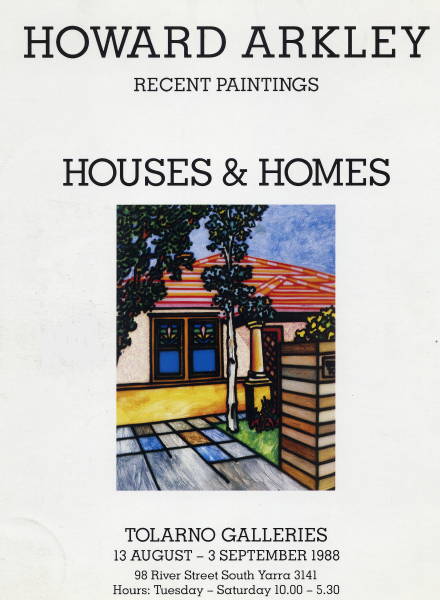
Australia’s Bicentennial was also a crucial year in Arkley’s career, marked by a flurry of activity, widespread exhibition of his work in a variety of curated shows, significant critical acclaim, and two key solo exhibitions – one surveying his career to date, the other looking forward to the suburban emphasis of his next decade.‘Casual Works’, shown at 200 Gertrude Street in May (and subsequently in Brisbane), rehearsed key themes from Arkley’s previous career, in a fascinating summary of the processes of influence and transformation underpinning his art. Several of the panels of source material preserved from this show were reunited in the Arkley retrospective at the NGVA in 2006-7, recalling the originality and insights of the 1988 exhibition.
The ‘Houses and Homes’ show at Tolarno (Aug.-Sept.) was his first fully suburban show, also introducing a new theme, the ‘Shadow Factory’. The exhibition was a significant commercial success; and the critics were also impressed (see detailed exhibition entry).It was already apparent to the more thoughtful commentators, even at this relatively early stage in Arkley’s suburban project, that he had something more sophisticated in mind than a simple celebration of suburban architecture and values, and this was immediately reinforced in the wake of the Tolarno show, with House and Garden Western Suburbs, Melbourne 1988. This monumental diptych, subsequently acquired by the National Gallery of Australia, definitively announced the possibility that Australian suburbia, so often derided in the past as irredeemably mediocre, could be seen, without a trace of irony, as not simply benign or comfortable, but paradoxically majestic, even heroic, for all its bourgeois tidiness (for extended comments along these lines, see Carnival 11ff.).
Photos of Arkley dating from 1988 include Martin Kantor’s archetypal black and white image of the artist in front of one of ‘his’ typical (built) suburban houses (reproduced in Duncan 1991: 2-3) – although at this stage he and Christine Johnson were living in a flat in East St Kilda. Still, paintings such as Home, Eastern Suburbs (1988) probably harked back to Arkley’s own memory of his childhood upbringing in Surrey Hills.
Late in the year, Arkley was a key figure in a series of volatile meetings held to protest against the management practices of the Australian Centre for Contemporary Art in Melbourne, eventuating in the resignation of director Richard Perram (documents in Arkley’s files, including press clippings from Dec.1988: see e.g. Crawford 1988 and Murdoch 1988).
1988 Exhibitions
‘1968-1988 Selected Works’ (group survey show): Roslyn Oxley9, Sydney, 6-30 January 1988 (exh.cat.in Arkley’s files)
- Arabesque 1978 = Arabesque 1979 [Curvilinear]
- Bodgie 1979
- Deco 1979
- 50s 1979 = 50’s 1979
- HA/Davila/Kozic: Untitled (‘Exquisite Corpse’) [1-4] (1984) [W/P]: sheets 1-3
‘The Newcastle Show Association $10,000 Invitation Art Purchase’, Newcastle Region Art Gallery, 19 Feb.-13 March 1988 (check-list in Arkley’s files)
‘Howard Arkley: Casual Works’, 1988
– refer linked entry for full details
‘La Bohème’, City Gall., Melb., 10 May-11 June 1988 (cur.John Nixon; catalogue in Arkley’s files)
Australian Contemporary Art Fair (ACAF1), Melb.Exhib.Buildings, 23-31 July 1988 (catalogue in Arkley’s library)
(i) Tolarno:
(ii) Roslyn Oxley9 (?):
‘Suburbanism’, George Paton Gall., Melb.U., 9 Aug.-1 Sept.1988 (curated by Juliana Engberg; catalogue in Arkley’s files; all 4 works illustrated in B&W and desc.as in coll.MCA, Brisbane; see also Vivian 2008: 118 and 172, noting further installation slides held in George Paton Gall. archive)
‘Howard Arkley: Recent Paintings – Houses & Homes’, Tolarno, Aug.-Sept.1988
– refer linked entry for full details
‘St Kilda I: Selected Acquisition Exhibition’, Linden Gallery (?), St Kilda, 23-25 Sept.1988 [check-list/cat. in State Library of Victoria, artists’ files (AAA), s.v. ‘Linden Gallery’; foreword by Kevin Wilson, Art Acquisitions Officer: held to inaugurate a St Kilda art coll.; initial allocation $8,000]
- cat.no.1: Modern O.Y.O.Flats 1988 (175 x 135; valued at $5,000) = Modern O.Y.O.Flats (1988)
‘The Naked City: Stories of the Late 80s’, S.A. Centre for Contemporary Art, Sept.-Oct.1988
[source: Spray research notes c.1996; unfortunately, efforts to trace details of the Arkley works shown have been unsuccessful to date]
‘Australian Art Post-1960’ Deutscher Gertrude Street, 16-28 Oct.1988 (cat. in Arkley’s files)
Hamilton Art Gall. [7th annual award], 3 Nov.-11 Dec.1988 (cat.in Arkley’s files)
- House (1988) [W/P] {unidentified} ($2000)
- Face (1988) [W/P] ($2,000)
‘Pictures in an Institution’, State Lib.of Vic., 18 Nov.1988 – 15 Jan.1989 (cat.in HA files)
[1] NB this work is listed in the check-list of works shown by Roslyn Oxley9 at ACAF1 in the State Library of Victoria’s artists files (AAA), s.v. ‘Roslyn Oxley 9 Gallery’; however, the work is not recorded or reproduced in the ACAF1 catalogue
